Related Research Articles

Maurice Ernest Gibb was a British musician and songwriter. He achieved worldwide fame as a member of the pop group Bee Gees. Although his elder brother Barry Gibb and twin brother Robin Gibb were the group's main lead singers, most of their albums included at least one or two songs featuring Maurice's lead vocals, including "Lay It on Me", "Country Woman" and "On Time". The Bee Gees are one of the most successful pop-rock groups of all time.

Cucumber Castle is the seventh studio album by the Bee Gees, released in April 1970. It was produced by Barry Gibb, Maurice Gibb, and Robert Stigwood. It consists of songs from their television special of the same name, which was named after a song on their 1967 album Bee Gees' 1st. Cucumber Castle is the only Bee Gees album not to feature any recorded contributions from Robin Gibb, as he had left the group before the album was recorded.

Best of Bee Gees is a 1969 compilation album by the English-Australian rock band Bee Gees. It was their first international greatest hits album. It featured their singles from 1966–1969 with the exception of the band's 1968 single "Jumbo".
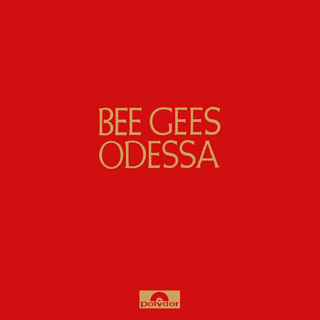
Odessa is the sixth studio album by the Bee Gees, a double vinyl LP released in February 1969, initially in an opulent red flocked cover with gold lettering. Despite reaching the UK Top Ten and the US Top 20, the album was not particularly well-received, though now is regarded by many as the most significant of the group's Sixties albums. An ambitious project, originally intended as a concept album on the loss of a fictional ship in 1899, it created tension and disagreements in the band regarding the work's direction; finally, a dispute over which song to release as a single led to Robin Gibb temporarily leaving the group.

Vincent Melouney is an Australian musician. He is best known as an official member of the Bee Gees from 1967 to 1969 during the group's initial period of worldwide success.

Horizontal is the fourth studio album by the Bee Gees, and their second album to receive an international release. The LP was released in early 1968, and included the international hit singles "Massachusetts" and "World". On 5 February 2007, Reprise Records reissued Horizontal with both stereo and mono mixes on one disc and a bonus disc of unreleased songs, non-album tracks, and alternate takes. The album was released in Polydor in many countries and on Atco only in the US and Canada. "And the Sun Will Shine" was released as a single only in France. The influences displayed on the album range from the Beatles to baroque pop.
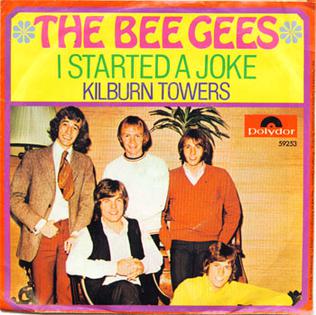
"I Started a Joke" is a song by the Bee Gees from their 1968 album Idea, which was released as a single in December of that year. It was not released as a single in the United Kingdom, where buyers who could not afford the album had to content themselves with a Polydor version by Heath Hampstead. This is the last Bee Gees single to feature Vince Melouney's guitar work, as he left the band in early December after this song was released as a single.
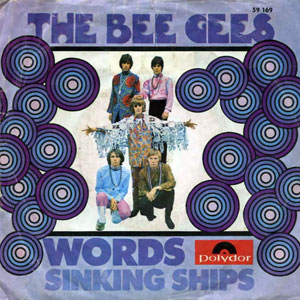
"Words" is a song by the Bee Gees, written by Barry, Robin, and Maurice Gibb. The song reached No. 1 in Germany, Canada, Switzerland and the Netherlands.
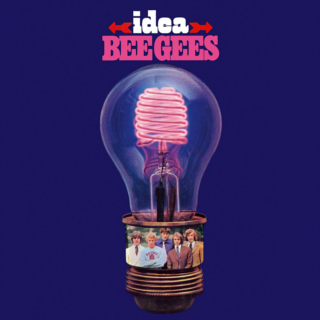
Idea is the fifth album by the Bee Gees. Released in August 1968, the album sold over a million copies worldwide. The album was issued in both mono and stereo pressings in the UK. The artwork on the Polydor release designed by Wolfgang Heilemann featured a "beehive" neon lightbulb with a group photo in its base, while the North American ATCO release designed by Klaus Voormann featured a composite head made from each band member. It was their third internationally released album – the first two albums being released only in the Australian market.
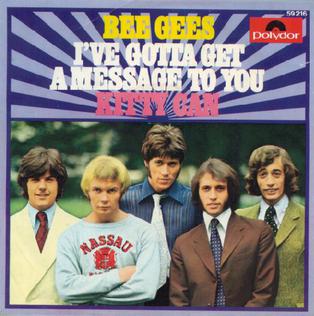
"I've Gotta Get a Message to You" is a song by the Bee Gees. Released as a single in 1968, it was their second number-one hit in the UK Singles Chart, and their first US Top 10 hit. Barry Gibb re-recorded the song with Keith Urban for his 2021 album Greenfields.
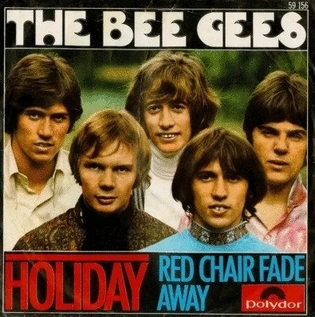
"Holiday" is a song released by the Bee Gees in the United States in September 1967. It appeared on the album Bee Gees' 1st. The song was not released as a single in their native United Kingdom because Polydor UK released the single "World" from their next album Horizontal.
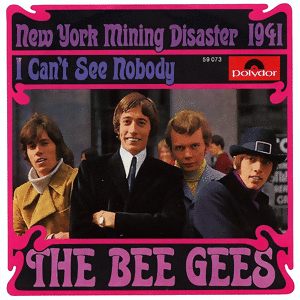
"New York Mining Disaster 1941" is the debut American single by the Bee Gees, released on 14 April 1967. It was written by Barry and Robin Gibb. Aside from a moderately successful reissue of their Australian single "Spicks and Specks," it was the first single release of the group's international career and their first song to hit the charts in both the UK and the US. It was produced by Ossie Byrne with their manager Robert Stigwood as executive producer. The song was the first track of side two on the group's international debut album, Bee Gees' 1st. This was the first single with Australian drummer Colin Petersen as an official member of the band.
"World" is a song by the Bee Gees, released in 1967 as a single in the United Kingdom and Europe and then included on their album Horizontal the following year. Though it was a big hit in Europe, Atco Records did not issue it as a single in the United States, having just issued a third single from Bee Gees' 1st, "Holiday".
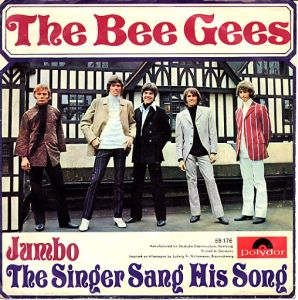
"Jumbo" is a song released by the Bee Gees, written by Barry, Robin and Maurice Gibb. It was released as a double A side with "The Singer Sang His Song" but featured as the lead track in some territories.

"First of May" is a song by the Bee Gees with lead vocals by Barry Gibb, released as a single from their 1969 double album Odessa. Its B-side was "Lamplight". It also featured as the B-side of "Melody Fair" when that song was released as a single in the Far East in 1971 as well as in 1976 and 1980 on RSO Records. It was the first Bee Gees single to be released after lead guitarist Vince Melouney had left the group.
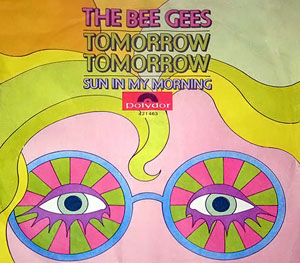
"Tomorrow Tomorrow" is a song by the Bee Gees written by Barry and Maurice Gibb. The song was originally intended to be recorded by Joe Cocker. It was the first Bee Gees single released after Robin Gibb had quit the group which was now down to a trio featuring Barry Gibb, Maurice Gibb and drummer Colin Petersen.

"I.O.I.O." is a song by the Bee Gees, released on the album Cucumber Castle. It was written by Barry and Maurice Gibb. The song was released as a single in March 1970, and was also one of the highlights of the album. The single was a relative success mainly on European charts. Its music video is taken from the film Cucumber Castle.

Bee Gees' 1st is the third studio album by the Bee Gees, and their first international full-length recording after two albums distributed only in Australia and New Zealand. Bee Gees' 1st was the group's debut album for the UK Polydor label, and for the US Atco label. Bee Gees 1st was released on 14 July 1967 in the UK. On 9 August it entered the UK charts; on that same day, the album was released in the US, and it entered the US charts on 26 August.
"Kitty Can" is a song by the Bee Gees, composed by Barry, Robin and Maurice Gibb. It was released as the B-side of "I've Gotta Get a Message to You" in July 1968, and as the second track on the album Idea in September 1968. In 1973, RSO Records released a compilation called Kitty Can only in Argentina and Uruguay, and this song appeared as the first track on that album.
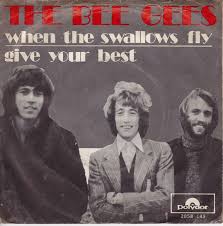
"When the Swallows Fly" is a song by the Bee Gees released on their fifth album Idea. Its promotional video was filmed in Brussels and included on the TV special Idea and was aired on 11 December 1968.
References
- ↑ Joseph Brennan. "Gibb Songs: 1968".
- 1 2 Hughes, Andrew (2009). The Bee Gees: Tales of the Brothers Gibb. p. 322. ISBN 9780857120045.
- ↑ "The Bee Gees: 35 Years of Music". Billboard. 24 March 2001. Retrieved 22 January 2015.
- 1 2 3 "Songs Written by the Gibb Family on the International Charts" (PDF). brothersgibb.org. Archived from the original (PDF) on 23 September 2015. Retrieved 22 January 2015.
- 1 2 "Bee Gees - The Singer Sang His Song". hitparade.ch. Retrieved 22 January 2015.
- ↑ "Bee Gees - Chart history". Official Charts Company. Retrieved 22 January 2015.